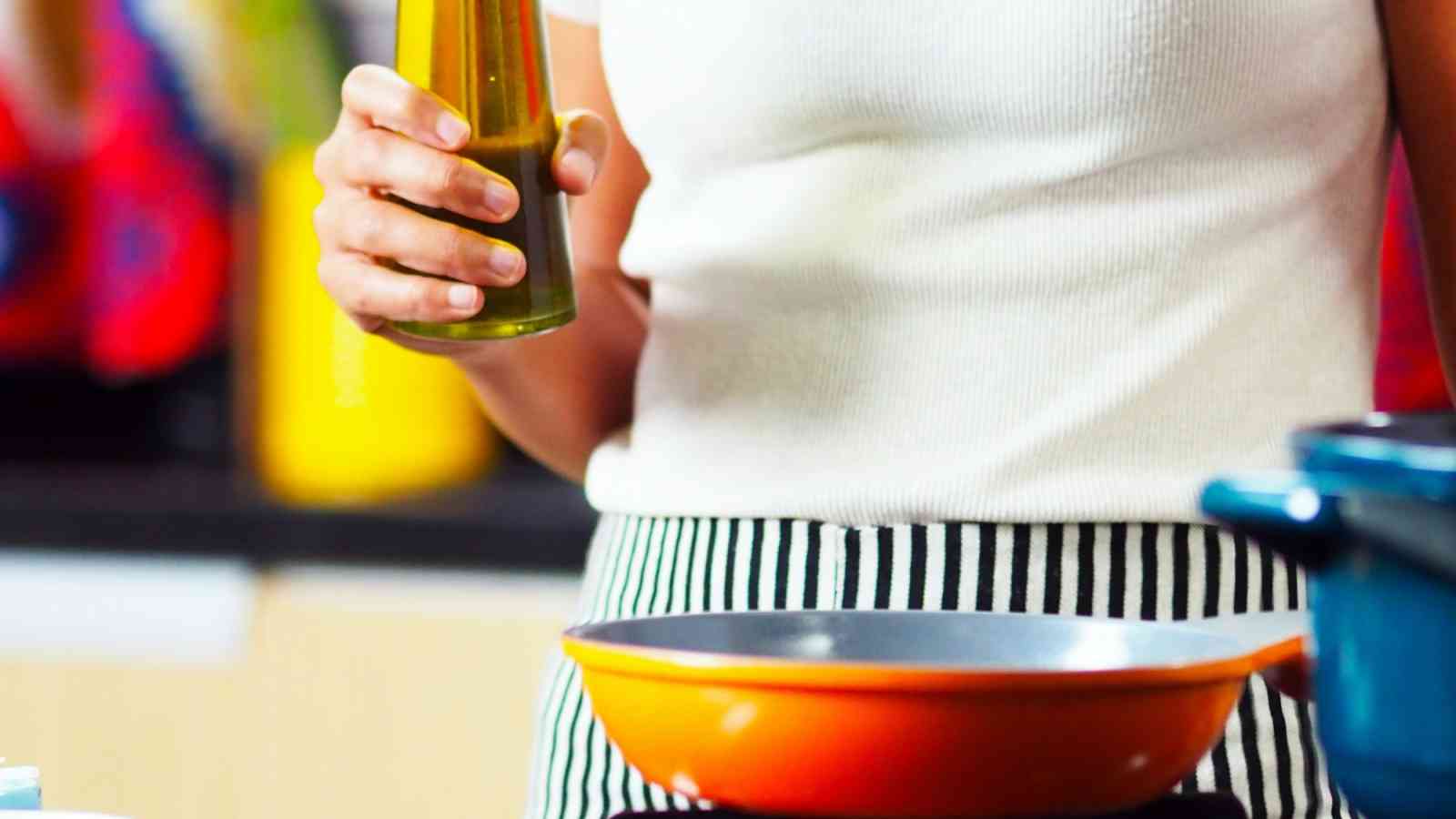
Cooking oils and pans
Your kitchen, pantry and food choices will be reflected through your health. Understand your oils and fats, and choose the best cooking methods to protect your cell membranes.
Choosing the best frying pan and cooking oil: a comprehensive guide
When it comes to cooking, the choices you make in selecting both your frying pan and cooking oil can significantly impact not only the flavor and quality of your meals but also your long-term health. In this guide, we’ll explore the best materials for frying pans and the most suitable oils for various cooking methods, helping you make informed decisions in the kitchen.
The Best Frying Pan Materials
- Stainless Steel
- Why it's great: Stainless steel is a top choice for many chefs due to its durability, non-reactivity, and ability to handle high heat. A quality stainless steel pan, particularly a multi-ply version like an All-Clad, offers even heat distribution and can last for generations.
- Health considerations: Stainless steel can leach small amounts of chromium, especially when cooking acidic foods, but this is generally not a concern. For everyday use, stainless steel is versatile and reliable.
- Cast Iron & Carbon Steel
- Why they’re great: Known for their excellent heat retention and naturally non-stick surfaces when seasoned, cast iron and carbon steel pans are ideal for high-heat cooking and searing.
- Health considerations: These pans can leach iron into your food, which may be a concern if you have a high iron intake from other sources. It’s best to use these pans occasionally rather than as your primary cookware. They are also very heavy.
- Glass
- Why it’s great: Glass cookware is non-toxic and doesn’t leach chemicals into your food. It’s particularly useful for slow cooking and baking.
- Health considerations: The main drawbacks of glass are its fragility and slower heating time. However, once heated, glass maintains temperature well.
- Ceramic
- Why it’s great: If you need a non-stick option, ceramic pans are a safer alternative to traditional non-stick pans. The non-stick coating is natural and free from harmful chemicals.
- Health considerations: Ceramic pans are not suitable for high-heat cooking and may degrade over time. Always check to ensure there are no additional non-stick coatings that could contain harmful substances.
- Copper
- Why it’s great: Copper pans are highly responsive to temperature changes, making them ideal for tasks requiring precise heat control, such as baking or making sauces.
- Health considerations: Copper can leach into food, especially when cooking acidic dishes. Most modern copper cookware is lined with stainless steel to prevent this. People with high copper should avoid traditional copper pans.
- Pans to AVOID
- Aluminium: Aluminium pans are highly reactive and can leach toxic metals into your food, posing risks such as neurodegenerative diseases. Avoid using aluminium cookware, especially when heating or cooking acidic foods.
- Non-stick (Teflon): Traditional non-stick pans are coated with chemicals that can release toxins and microplastics into your food when heated. Even minor scratches can cause harmful particles to leach into your meals.
Choosing the Right Cooking Oil
The oil you cook with is just as important as the pan you use. Different oils have different smoke points, which is the temperature at which an oil starts to smoke, break down and lose its nutritional value. Using the right oil for the right cooking method ensures better flavour and health benefits.
High-Heat Cooking Oils
- Avocado Oil
- Smoke Point: 270 °C
- Best Uses: High-heat cooking, sautéing, grilling, frying
- Notes: Avocado oil is rich in monounsaturated fats and is stable at high temperatures, making it versatile for various cooking methods.
- Ghee (Clarified Butter)
- Smoke Point: 250 °C
- Best Uses: High-heat cooking, baking
- Notes: Ghee is butter with the milk solids removed, making it suitable for people sensitive to dairy. It adds a rich flavor to dishes and is excellent for frying and roasting.
- Coconut Oil
- Smoke Point: 230 °C (refined)
- Best Uses: High-heat cooking, sautéing, baking
- Notes: Solid at room temperature, coconut oil is a stable fat ideal for baking and medium-heat cooking. If sold as a liquid, it may be blended with other oils.
- Lard and Tallow
- Smoke Point: 190°C - 210°C
- Best Uses: High-heat cooking, frying
- Notes: Animal fats are great for high-heat cooking but should be sourced from pasture-raised, organic animals to avoid unwanted additives and toxins.
Low-Heat Cooking Oils
- Olive Oil
- Smoke Point: 160°C - 240°C (extra virgin to refined)
- Best Uses: Low-heat cooking, sautéing, dressing, finishing
- Notes: Olive oil is rich in antioxidants and healthy fats but can lose flavor and nutritional value when overheated. It’s best used for drizzling, dressings, or low-heat applications.
- Macadamia Nut Oil
- Smoke Point: 210°C
- Best Uses: Low-heat cooking, dressings, finishing
- Notes: This oil has a mild flavor and is excellent for salad dressings and low-heat cooking.
- Sesame Oil
- Smoke Point: 170-210°C (unrefined to refined)
- Best Uses: Dressing, finishing
- Notes: Sesame oil has a high antioxidant content, making it more stable for heat and perfect for enhancing flavour in dressings and stir-fries.
Oils to Avoid
- Vegetable oil, Canola/ Rapeseed oil, Corn oil, Sunflower oil, Soybean oil
- Health considerations: These oils are highly processed and high in omega-6 fatty acids, which can contribute to chronic inflammation. They are often refined using heat and chemicals, which destroy beneficial properties and introduce toxic fats. Seed are produced by bleaching, solvents and deodorising thus adds additional chemicals to your food.
Tips for Buying and Storing Cooking Oils
- Purchase oils in dark glass bottles: This prevents light from damaging the oil.
- Store oils in a cool, dark place: Heat and light can cause oils to oxidize and become rancid.
- Avoid oils in plastic containers: Plastics can leach chemicals into the oil, especially when exposed to heat.
Conclusion
Selecting the right frying pan and cooking oil is essential for both your culinary success and overall health. A high-quality stainless steel pan offers versatility and longevity, making it a great all-around choice. Complement your cookware with appropriate oils like avocado, ghee, or coconut oil for high-heat cooking, and reserve delicate oils like extra virgin olive oil for low-heat applications. Avoid highly processed oils and cookware materials like aluminum and non-stick coatings to minimize exposure to harmful substances. With these guidelines, cook with confidence knowing that you’re making the right choice for your health and well-being!
